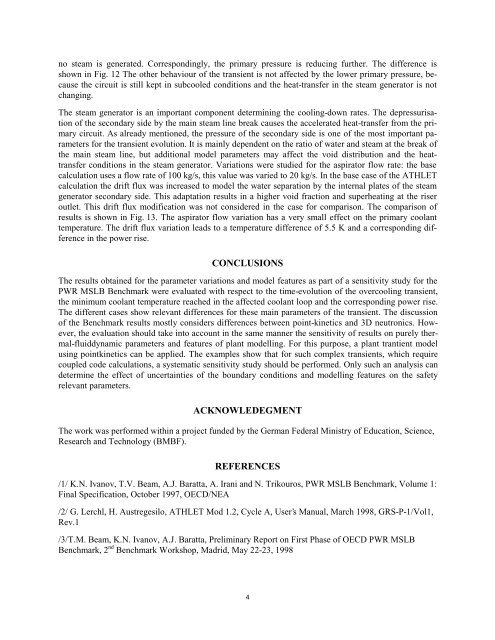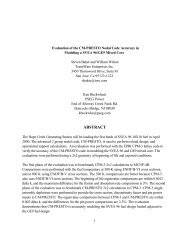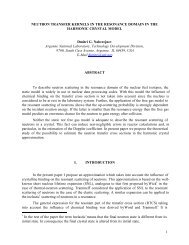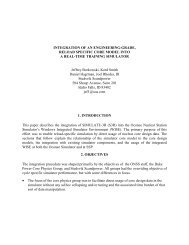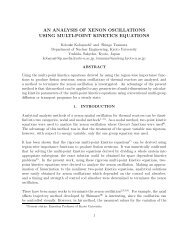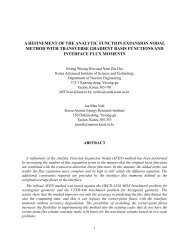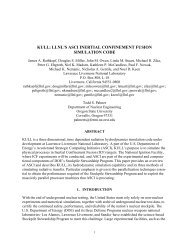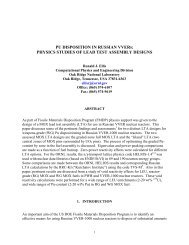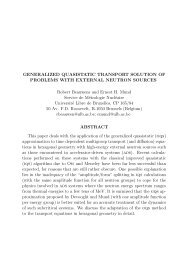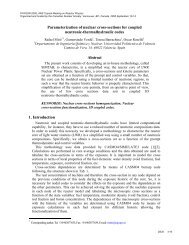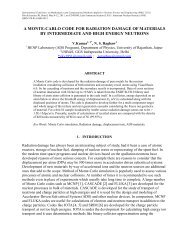S. Langenbuch, K.-D. Schmidt, and K. Velkov
S. Langenbuch, K.-D. Schmidt, and K. Velkov
S. Langenbuch, K.-D. Schmidt, and K. Velkov
Create successful ePaper yourself
Turn your PDF publications into a flip-book with our unique Google optimized e-Paper software.
no steam is generated. Correspondingly, the primary pressure is reducing further. The difference is<br />
shown in Fig. 12 The other behaviour of the transient is not affected by the lower primary pressure, because<br />
the circuit is still kept in subcooled conditions <strong>and</strong> the heat-transfer in the steam generator is not<br />
changing.<br />
The steam generator is an important component determining the cooling-down rates. The depressurisation<br />
of the secondary side by the main steam line break causes the accelerated heat-transfer from the primary<br />
circuit. As already mentioned, the pressure of the secondary side is one of the most important parameters<br />
for the transient evolution. It is mainly dependent on the ratio of water <strong>and</strong> steam at the break of<br />
the main steam line, but additional model parameters may affect the void distribution <strong>and</strong> the heattransfer<br />
conditions in the steam generator. Variations were studied for the aspirator flow rate: the base<br />
calculation uses a flow rate of 100 kg/s, this value was varied to 20 kg/s. In the base case of the ATHLET<br />
calculation the drift flux was increased to model the water separation by the internal plates of the steam<br />
generator secondary side. This adaptation results in a higher void fraction <strong>and</strong> superheating at the riser<br />
outlet. This drift flux modification was not considered in the case for comparison. The comparison of<br />
results is shown in Fig. 13. The aspirator flow variation has a very small effect on the primary coolant<br />
temperature. The drift flux variation leads to a temperature difference of 5.5 K <strong>and</strong> a corresponding difference<br />
in the power rise.<br />
CONCLUSIONS<br />
The results obtained for the parameter variations <strong>and</strong> model features as part of a sensitivity study for the<br />
PWR MSLB Benchmark were evaluated with respect to the time-evolution of the overcooling transient,<br />
the minimum coolant temperature reached in the affected coolant loop <strong>and</strong> the corresponding power rise.<br />
The different cases show relevant differences for these main parameters of the transient. The discussion<br />
of the Benchmark results mostly considers differences between point-kinetics <strong>and</strong> 3D neutronics. However,<br />
the evaluation should take into account in the same manner the sensitivity of results on purely thermal-fluiddynamic<br />
parameters <strong>and</strong> features of plant modelling. For this purpose, a plant trantient model<br />
using pointkinetics can be applied. The examples show that for such complex transients, which require<br />
coupled code calculations, a systematic sensitivity study should be performed. Only such an analysis can<br />
determine the effect of uncertainties of the boundary conditions <strong>and</strong> modelling features on the safety<br />
relevant parameters.<br />
ACKNOWLEDEGMENT<br />
The work was performed within a project funded by the German Federal Ministry of Education, Science,<br />
Research <strong>and</strong> Technology (BMBF).<br />
REFERENCES<br />
/1/ K.N. Ivanov, T.V. Beam, A.J. Baratta, A. Irani <strong>and</strong> N. Trikouros, PWR MSLB Benchmark, Volume 1:<br />
Final Specification, October 1997, OECD/NEA<br />
/2/ G. Lerchl, H. Austregesilo, ATHLET Mod 1.2, Cycle A, User’s Manual, March 1998, GRS-P-1/Vol1,<br />
Rev.1<br />
/3/T.M. Beam, K.N. Ivanov, A.J. Baratta, Preliminary Report on First Phase of OECD PWR MSLB<br />
Benchmark, 2 nd Benchmark Workshop, Madrid, May 22-23, 1998<br />
4


